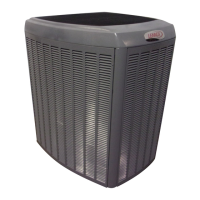Page 10
506044−01 06/08
2
3
4
5
6
OUTDOOR
UNIT
LIQUID LINE
SUCTION LINE
SERVICE
VALVE
SERVICE
VALVE
CUT AND DEBUR
ATTACH
GAUGES
WRAP
SERVICE
VALVE
FLOW NITROGEN
NITROGEN
BRAZE LINE SET
1
INSTALL CORE ONLY FOR
BOTH SERVICE PORTS AFTER
THEY HAVE COOLED.
7
INDOOR UNIT
REMOVE CAP AND CORE FROM
BOTH LIQUID AND SUCTION
SERVICE PORTS
SERVICE PORT MUST BE
OPEN TO ALLOW EXIT
POINT FOR NITROGEN
Figure 19. Brazing Connections
BRAZING CONNECTION PROCEDURE
Before brazing, remove the access panel as illustrated in
figure 13; then remove the narrow piping panel to prevent
burning off the paint as illustrated in figure 20.
REMOVE 2 SCREWS
AND REMOVE PANEL
BEFORE BRAZING.
PIPING
PANEL
LINE SET
CONNECTION
POINTS.
Figure 20. Piping Panel Removal
WARNING
When using a high pressure gas such
as dry nitrogen to pressurize a
refrigeration or air conditioning
system, use a regulator that can
control the pressure down to 1 or 2
psig (6.9 to 13.8 kPa).
WARNING
Polyol ester (POE) oils used with HFC−410A
refrigerant absorb moisture very quickly. It is very
important that the refrigerant system be kept
closed as much as possible. DO NOT remove line
set caps or service valve stub caps until you are
ready to make connections.
WARNING
Danger of fire. Bleeding the
refrigerant charge from only the high
side may result in the low side shell
and suction tubing being
pressurized. Application of a brazing
torch while pressurized may result in
ignition of the refrigerant and oil
mixture − check the high and low
pressures before unbrazing.
1. Cut ends of the refrigerant lines square (free from
nicks or dents). Debur the ends. The pipe must remain
round, do not pinch end of the line.
2. Remove service cap and core from both the suction
and liquid line service ports.
3. Connect gauge low pressure side to liquid line service
valve.
4. To protect components during brazing, wrap a wet
cloth around the liquid line service valve body and
copper tube stub and use another wet cloth
underneath the valve body to protect the base paint.
Also, shield the light maroon HFC−410A sticker.

